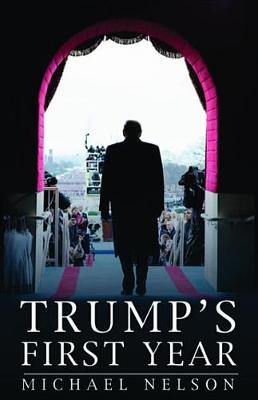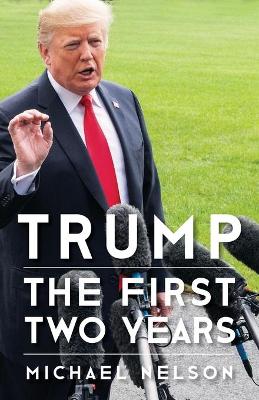Miller Center Studies on the Presidency
2 total works
Donald Trump took office in January 2017 under mostly favorable conditions. He inherited neither a war nor an economic depression, and his party controlled both houses of Congress. He leveraged this successfully in some ways by delivering on his campaign promises to roll back regulations on business, and he saw his nominee for the Supreme Court, Neil Gorsuch, approved swiftly and with little controversy. Many more actions, however, have been perceived as failures or even threats to a safe, functional democracy, from immigration policies defied by state and local governments and volatile dealings with North Korea to unsuccessful attempts to pass major legislation and the inability to fill government positions or maintain consistent White House staff.
In Trump's First Year, Michael Nelson, one of our finest and most objective presidential scholars, provides a thorough account and scholarly assessment of Donald Trump's first year as president, starting with his election and transition in 2016. The analysis is grounded in the modern history of the presidency as well as in the larger constitutional and political order. Nelson considers the dramatic election itself, the forming and reforming of the administration, congressional relations, executive actions, bureaucratic politics, judicial appointments and decisions, media relations and public communications, and public opinion.
Published on the first anniversary of Trump's inauguration, Nelson's book offers the most complete and up-to-date assessment of this still-unfolding story.
In Trump's First Year, Michael Nelson, one of our finest and most objective presidential scholars, provides a thorough account and scholarly assessment of Donald Trump's first year as president, starting with his election and transition in 2016. The analysis is grounded in the modern history of the presidency as well as in the larger constitutional and political order. Nelson considers the dramatic election itself, the forming and reforming of the administration, congressional relations, executive actions, bureaucratic politics, judicial appointments and decisions, media relations and public communications, and public opinion.
Published on the first anniversary of Trump's inauguration, Nelson's book offers the most complete and up-to-date assessment of this still-unfolding story.
On the first anniversary of Donald Trump's presidency, Michael Nelson, one of our finest and most objective presidential scholars, published Trump's First Year, a nonpartisan assessment that was widely hailed as the best account of one of the most unusual years in presidential history. At the midpoint of Trump's term, Nelson has updated his book to include the second year, which if anything has proven to be even more remarkable.
Beginning with an examination of the dramatic 2016 election, Nelson's book follows Trump as he takes office under mostly favorable conditions, with relative stability at home and abroad and his party in control of both houses of Congress. Trump leveraged this successfully in some ways, from the confirmation of his nominee Neil Gorsuch to the Supreme Court to the passage of his tax-reform bill. But many more actions were perceived as failures or even threats to a safe, functional democracy, including immigration policies defied by state and local governments, volatile dealings with North Korea, unsuccessful attempts to pass major legislation, and the inability to fill government positions or maintain consistent White House staff.
As Nelson demonstrates in a substantial addition to the original book, Trump's effectiveness, or lack thereof, did not change significantly in his second year in office, but his approach often did. With the Mueller investigation and the midterm elections looming, Trump threw off his advisors' restraints and acted more directly on his impulses, reverting to the instincts and rhetoric that had won him the election. While opposition to Trump remained strong in many quarters, resistance among GOP leaders crumbled as they were confronted with their constituents' support of the president.Published on the second anniversary of Trump's inauguration, Nelson's book offers the most complete and up-to-date assessment of this still-unfolding story.
Beginning with an examination of the dramatic 2016 election, Nelson's book follows Trump as he takes office under mostly favorable conditions, with relative stability at home and abroad and his party in control of both houses of Congress. Trump leveraged this successfully in some ways, from the confirmation of his nominee Neil Gorsuch to the Supreme Court to the passage of his tax-reform bill. But many more actions were perceived as failures or even threats to a safe, functional democracy, including immigration policies defied by state and local governments, volatile dealings with North Korea, unsuccessful attempts to pass major legislation, and the inability to fill government positions or maintain consistent White House staff.
As Nelson demonstrates in a substantial addition to the original book, Trump's effectiveness, or lack thereof, did not change significantly in his second year in office, but his approach often did. With the Mueller investigation and the midterm elections looming, Trump threw off his advisors' restraints and acted more directly on his impulses, reverting to the instincts and rhetoric that had won him the election. While opposition to Trump remained strong in many quarters, resistance among GOP leaders crumbled as they were confronted with their constituents' support of the president.Published on the second anniversary of Trump's inauguration, Nelson's book offers the most complete and up-to-date assessment of this still-unfolding story.

